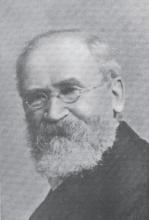Andrew Martin Fairbairn was born 4 November 1838 in Inverkeithing Fife to Helen and John Fairbairn, a miller and leader in the United Secession Church. Despite having little education as a child and working from the age of nine, he read widely and studied deeply on his own.
He undertook his first university studies in theology at Edinburgh and later Berlin, although he did not earn degrees from either institution. In 1850 he enrolled in the Theological College of the Union in Glasgow and was ordained to the Evangelical Union pastorate in Bathgate three years later.
Fairbairn’s career from then on involved not only preaching, but teaching, writing, and lecturing. In 1872, he moved from Bathgate to St. Paul’s Congregational Church in Aberdeen, and then to Airedale College in Bradford, where he was appointed Principal in 1877. In 1886 he was chosen to become the founding principal of Mansfield College in Oxford, where his reputation as a teacher grew ever stronger. Although he had never taken degrees at Edinburgh or Berlin, in the course of his career he obtained doctorates in divinity at Edinburgh Yale Wales Manchester and Göttingen, in law at Aberdeen, and in literature at Leeds. He also served as a member of the Royal Commission of Secondary Education between 1894 and 1895 and was on the Royal Commission on the Endowments of the Welsh Church in 1906. In addition to his Gifford Lectures at Aberdeen (1892–1894), he also delivered the Muir Lectures at Edinburgh University (1878–1882), the Lyman Beecher Lectures at Yale (1891–1892), and finally the Haskell Lectures in India (1898–1899). He eventually retired from his position at Mansfield College in the spring of 1909.
Fairbairn’s two most significant written works are Christ in Modern Theology (1893) and The Philosophy of the Christian Religion (1902). Together they establish him as a reformist and liberal theologian with strong leanings toward Hegelian idealism. Among his core interests was the central place of Christ in Christian theology and how to understand it within the philosophical context of his day. In a Hegelian spirit, he rejected traditional views of God’s changelessness, instead seeing the incarnation as a surrendering of attributes such as omniscience, while retaining the core attributes of love and truth.
Although his work may have lost its relevance today in his time he was viewed as a liberal and, to some traditionalists, a radical. His liberal and reformist impulse led him into controversy throughout his career particularly with Cardinal Newman in light of Fairbairn’s Catholicism Roman and Anglican (1899). He was also deeply concerned with the reform of theological education, the legacy of which could be seen not only in his participation in various educational commissions but also in his direct consultative involvement in the establishment of theological faculties in the Universities of Manchester and Wales.
Some of the controversy he attracted, however, was not to his advantage. His Gifford Lectures on comparative religion at Aberdeen between 1891 and 1893 were never published, seemingly due to severe criticism over his pronouncements on Chinese religion.
Fairbairn died on 9 February 1912 in Buckingham Gate London. He left his wife Jane whom he had married in 1868 and two sons and two daughters
Fairbairn’s works include: Studies in the Philosophy of Religion and History (1876); The City of God (1882); Christ in Modern Theology (1893); Catholicism Roman and Anglican (1899); The Philosophy of the Christian Religion (1902); chapters on ‘Calvin’ and ‘Tendencies of European Thought in the Age of the Reformation’ for the second volume of the Cambridge Modern History (1903); and a volume of Studies in Religion and Theology (1910). W. B. Selbie wrote his biography entitled The Life of Andrew Martin Fairbairn (1914).



